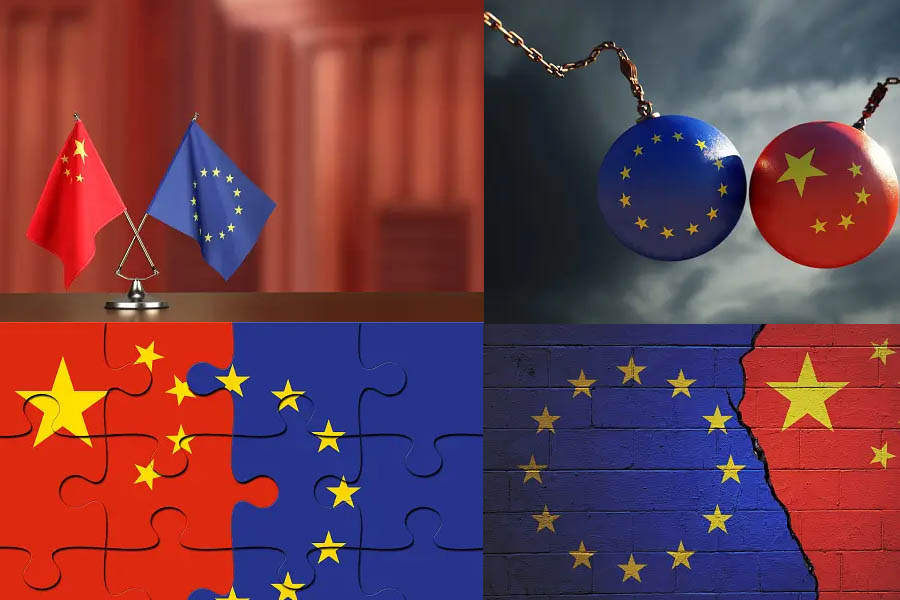
In a move stirring diplomatic tensions, reports have surfaced indicating the European Union's intention to impose sanctions on Chinese entities allegedly supplying dual-use products to Russia for its operations in the Ukraine conflict. Beijing swiftly expressed its opposition to what it perceives as "illegal sanctions" and raised concerns about the EU's encroachment on its cooperation with Russia.
Dive into the escalating tensions as the European Union considers imposing sanctions against Chinese companies allegedly involved in the conflict in Ukraine. Explore the intricate web of international relations, trade dynamics, and diplomatic negotiations as geopolitical tensions rise. Gain insights into the potential implications of these developments on global security and the shifting dynamics of international diplomacy.
The Chinese Ministry of Foreign Affairs, though currently in the midst of Chinese New Year celebrations and foregoing its regular media briefings, issued a statement condemning the proposed sanctions. The Ministry asserted China's firm opposition to any measures of "long-arm jurisdiction" targeting Chinese entities based on their cooperation with Russia.
Media outlets, referencing a leaked 91-page document, revealed the EU's plan to sanction around 55 companies and over 60 individuals accused of supporting Russia's activities in Ukraine. Notably, the EU refrained from disclosing the names of the implicated companies. Reports suggest that among these entities are firms situated in Hong Kong, Serbia, India, Turkey, as well as three mainland Chinese companies and four Hong Kong-based ones.
If implemented, this would mark the EU's first instance of imposing restrictions on mainland Chinese companies since the onset of the Ukraine crisis. The proposed sanctions package represents the EU's 13th punitive measure following Russia's incursion into Ukraine, with over 600 companies already targeted, primarily Russian-based entities.
This development follows recent discussions between the EU, the United States, and the United Kingdom in Brussels, aimed at fortifying existing restrictions to prevent circumvention by Moscow. Meanwhile, European leaders have also engaged China on this matter, urging action to curb the alleged flow of dual-use goods to Russia.
Amidst these geopolitical tensions, voices from China, including military commentator "Snow Wolf," argue against restrictions on Chinese-Russian cooperation. Snow Wolf contends that such measures would only serve to benefit Western powers and exacerbate the situation without addressing the root causes of the conflict.
The proposed sanctions come at a delicate time for China-EU relations, with ongoing discussions on the Comprehensive Agreement on Investment (CAI) stalled since May 2021 over human rights concerns in China's Xinjiang region. Despite efforts to resume negotiations, strained diplomatic ties and shifting geopolitical dynamics pose significant obstacles to a swift resolution.
French President Emmanuel Macron's remarks on Russia's alignment with China further underscore the complexities in European diplomatic relations. As calls intensify within Europe to reevaluate engagements with China, the path to reinvigorating dialogue on the CAI becomes increasingly uncertain. The looming specter of sanctions against Chinese companies underscores the intricate web of geopolitics shaping global affairs, with repercussions that extend far beyond the realms of commerce and trade. As diplomatic tensions simmer, the future trajectory of China-EU relations remains uncertain, fraught with challenges and opportunities alike.
Message To The Readers:
EU's Deliberation on Sanctions: The article may discuss the European Union's internal debates and considerations regarding the imposition of sanctions against Chinese companies allegedly involved in the conflict in Ukraine.
Allegations Against Chinese Companies: It might outline the specific allegations or evidence implicating Chinese companies in the Ukraine war, shedding light on the complexities of international conflicts and corporate involvement.
Geopolitical Implications: The article could analyze the potential geopolitical implications of the EU's decision, including its impact on EU-China relations, global trade dynamics, and the broader geopolitical landscape.
Diplomatic Relations: It may explore the diplomatic ramifications of the EU's stance, considering how the imposition of sanctions could affect diplomatic relations between the EU, China, and other relevant stakeholders, and how diplomatic efforts are being pursued to address the situation.
Thank you for reading: globalpostheadline.com | If you want to advertise your Company, Events, Movies, Products, Hotels, Travel Packages Let us know